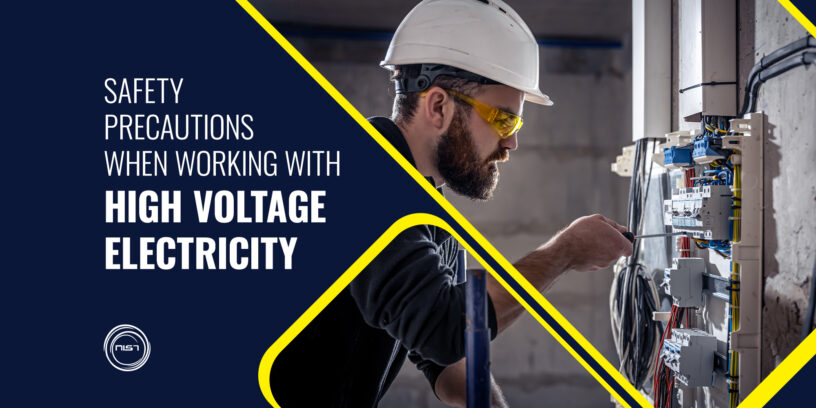We are aware that electricity is primarily used to power the majority of equipment. We largely rely on electricity for many of our necessities. But, as we all know, an electrical mishap could result in fatalities or serious injuries. High voltage electricity is a type of power that carries a significant voltage. It is a lot more powerful than low-voltage electricity and can be lethal if handled improperly.
High voltage electricity can be dangerous in a number of ways.
- It can be corrosive and destroy any material that it comes into contact with
- It can also be fatal if it is used incorrectly or near things that can cause shocks
High voltage electricity must be regulated:
High Voltage Electricity can be used for a number of purposes, from power generation to feeding industrial plants. When the electricity reaches the final stage, it can be used for industrial purposes.
High Voltage Electricity must be kept away from people and the environment in order to avoid accidental damage and shock. It can be transported safely by using insulated hoses. When the power reaches its final destination, it can be used for electrical devices.
High voltage electricity can lead to workplace accidents and lead to physical damage and potential safety hazards, as well as cost businesses large sums of money. High-voltage electricity is a dangerous force that can be detrimental to people and properties in the surrounding area. To be safe and effective, high voltage electricity must be kept regulated and under supervision. This ensures the power levels are kept safe and within industry-approved parameters. The use of high-voltage electricity can be regulated by the installation of a circuit breaker.
It’s crucial to keep in mind that the majority of electrically related injuries and fatalities aren’t caused by high voltage electricity, but rather by faulty or hazardous electrical wiring.
When working with high voltage, it is important to take safety precautions to avoid injuries. Always use proper safety equipment, including gloves, a face shield, and a grounding strap. If you are working with high-voltage equipment in a confined space, always use a proper isolation transformer. When working with high voltage, it is important to take a number of safety precautions to ensure that you and your team are safe.
- Always use proper safety equipment, including appropriate gloves, safety glasses, and a face shield.
- Always use a grounded safety chain or cable when working with high voltage.
- Always be cautious when working near high-voltage power lines.
- Always keep a safe distance from high-voltage equipment.
- Always follow the safety guidelines provided by your company or organization.
Furthermore, the following measures can reduce the risk of electric shock:
- Never touch a live wire or electrical equipment with wet or bare hands as it can make the skin sensitive to electricity.
- Always use gloves or something else to keep the skin from touching the wire or equipment
- Never wear clothes that are loose around the chest and waist when working near electricity or water. The loose clothes can catch a wire or electric cable that could contact the skin
- Be sure that the voltage on the circuit box is the correct voltage.
- When working with any electricity, never be in contact with it if you are feeling unwell, have an open wound, or are pregnant
- When working around a water heater or power circuit box, wear gloves
- Take the time to install safety devices, such as safety switches, circuit breakers, or grounding rods
It is critical to follow safe practices in order to use your power supply safely. When using your power supply, ensure that you are not putting yourself in harm’s way when using it. Hence, it is important to ensure that you conduct safe practices to keep yourself safe while using your power supply. Please take note of the following safety information:
- The electrician must work in a safe location
- All circuit breakers must be guarded and kept in good working order
- Only qualified electrical personnel should handle any equipment or parts which could be a hazard
- All connections must be properly grounded
- All electrical work shall be performed in a safe manner, taking care to protect oneself from electrocution and burns
- Any work with high voltage equipment shall be under the direction of a qualified electrical or electrical/mechanical contractor, electrician, or other trained personnel
- Inspection of all equipment shall be done prior to purchase, installation, or repair
- Insulate all power leads and power cables properly
- Never cut the power to a power source without first determining if the equipment needs to be repaired or replaced
- Never touch any component of a power supply or power distribution system with bare hands, including but not limited to electrical components, terminals, or connections
- Never work on any power supply or power distribution system while holding or touching a piece of equipment
- Only use the approved, non-conductive, and non-magnetic work gloves supplied by the manufacturer of any power source
- Do not repair, work on, or otherwise modify or touch any equipment without properly using a non-conductive and non-magnetic work glove
- Inspect all connections in a building before allowing entry to anyone in the building
- Be mindful that the electricity supply may be turned on or off at any time and will cause injury to anyone near it
- Do not touch any electrical supply or system unless they have been previously inspected and verified
- Never work on any power supply or power distribution system while holding or touching a piece of equipment
- Protecting yourself while working with electricity is a necessity. Use of personal protective equipment is your responsibility
- Electrical inspections on site are a great way to get a good grip on what is going on in the workplace and to make sure that nothing is missing or wrong
The Importance of Electrical Safety Training:
Check below some of the reasons why an electric safety program is important in workplaces:
- To prevent or minimize electric shock in the workplace
- To raise awareness and understand the dangers of electric shocks
- To give employees the skills and confidence to recognize, respond to, and report potential hazards that can result in electric shock.
Employers are accountable for employee safety, whether that means providing training to reduce the danger of electrocution or fostering a general culture of safety that all employees must adhere to. Safety in the workplace means making sure that all workers are not only kept safe in normal situations but are also trained to react appropriately to emergencies and safety situations. Our Safety training programs are designed to help workers understand and be able to respond appropriately to a variety of safety issues and conditions in the workplace. For a better, safer workplace, we strongly suggest employees enroll in a safety training program. Happy Learning!














Leave a Reply